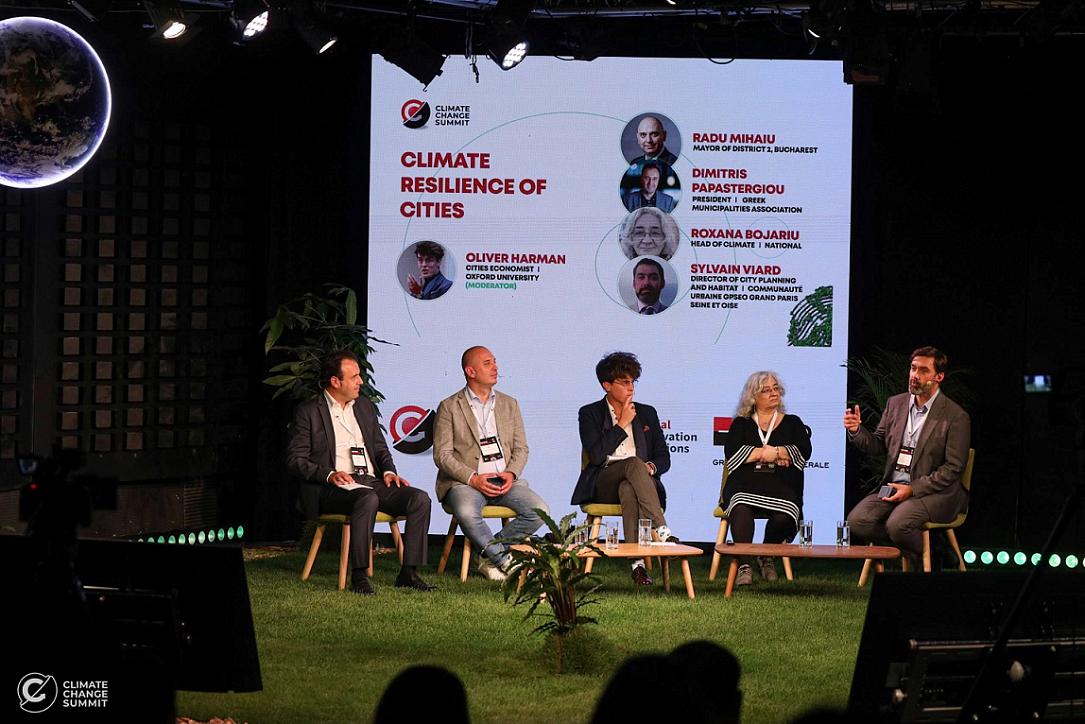Bucharest Climate Change Summit overview: Urgency of specific policies, more environmentally-conscious lifestyle in focus



The speakers underlined the urgency of a more environmentally-conscious lifestyle and specific policies that can be implemented at all levels to safeguard the world’s and Romania’s biodiversity, forests, and also its cities and economy.
The event, organized by BRD Groupe Société Générale and Social Innovation Solutions as part of the Lumea9 (New World) sustainability platform, took place at the Odeon Theater in Bucharest between 4 and 5 October.
The forum featured speakers such as the World Bank’s Anna Akhalkatsi, country manager for Romania and Hungary, Emmanuel Martinez, chief environment economist at Société Générale, Romanian ministers Sebastian Burduja, Florin Spătaru and Tanczos Barna, as well as many others. The event also included a video message from Indian spiritual leader Sadhguru. Romanian president Klaus Iohannis sent a message to the audience, delivered by Maria Bocșe, a state councilor with the Climate and Sustainability Department.
The stage of the Odeon theater, from which speakers addressed those gathered in the room as well as around 4,000 people attending remotely, was covered with real grass for the summit. Each guest tackled specific environmental topics ranging from biodiversity to energy consumption and storage. The event took place mostly in English, but some speakers chose to use Romanian during their time on stage.
Hans van der Loo, chairman of the Institute for Integrated Economic Research, noted that much of humanity’s assets are built along coasts and that cities such as Venice, Amsterdam, or Hamburg would be flooded if the Greenland icecap would melt. He also said that massive CO2 emissions are involved in producing a single combustion-powered car, which are released before the car is ever driven, and that fundamental changes in humanity’s lifestyle must occur.
Environmentalist and high-altitude climber Alex Găvan, participating in one panel, made an impassionate plea for the preservation of the remaining forests that surround Bucharest and other major cities. Găvan has repeatedly called for the creation of a protected Green Belt of Bucharest in the past, stressing that the capital’s green areas are disappearing at an alarming rate while pollution increases. This year, he also launched a non-profit aiming to protect the asprete, a 65-million-year-old fish that can still be found in Romania’s Făgăraș Mountains. A contemporary of dinosaurs and one of the rarest fish species in Europe and the world, the asprete population has been impacted by the unsustainable exploitation of rivers and is now labeled critically endangered.
Anna Akhalkatsi, representing the World Bank, stressed the financial costs of ignoring climate change and said that environmental changes could push 132 million people into poverty and drive 216 million others to migrate by 2030. She also said that those suffering the heaviest consequences are those in already disadvantaged areas.
“We are co-authoring our own demise, and those out of reach of the pen suffer the most,” Akhalkatsi argued. Turning to Romania, she warned that banks in the country are too exposed to the effects of climate change, that green bonds and loans are needed, and that Romania’s robust economic growth has already come at a substantial cost for its natural resources.
Giedrimas Jeglinskas, Assistant Secretary General at NATO, tied security to climate change, noting that the latter acts as a crisis and threat multiplier, hence NATO’s interest in the domain.
Eila Kreivi, Chief Sustainable Finance Advisor at the European Investment Bank, pointed at the war in Ukraine as a turning point that should make Europe less dependent on fossil fuels. She also highlighted her bank’s involvement in projects boosting the thermal energy efficiency of buildings in Bucharest’s District 2.
Andreas Beckmann, CEO of WWF’s Central and Eastern Europe wing, tackled biodiversity. He noted that 68% of wildlife populations were lost over the last 50 years and that inaction on climate change could cause a drop worth a fifth of the global economy.
Invited in a panel along with several environmental experts, District 6 mayor Ciprian Ciucu argued that the will necessary for radical changes meant to preserve Bucharest’s green areas – both at the level of politicians and the general population – is still lacking. He drew from his experience as mayor and said that some citizens are more interested in parking spaces than parks.
Speaking in a secondary panel, District 2 mayor Radu Mihaiu noted the success of the bike lanes on Calea Victoriei, and argued that Bucharest needs more such lanes, even if they are to be taken from car lanes. Unique lanes for buses, however, failed according to the mayor. He said that new regulations and policies will also fail if the people are not ready to accept them.
Ministers Tanczos Barna (environment), Florin Spătaru (economy), and Sebastian Burduja (research and innovation) were also among the speakers at the Climate Change Summit. They argued that solutions to climate change cannot come solely from the government and that a partnership needs to be established between corporations, the public sector, and the wider society. Transportation, manufacturing, and economic growth were also some of the topics that the three ministers discussed.
(Photo: Climate Change Summit Facebook Page)